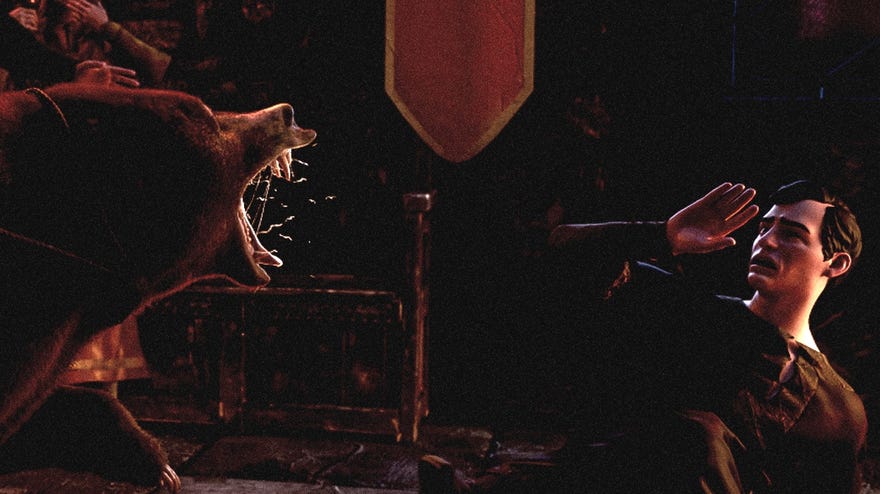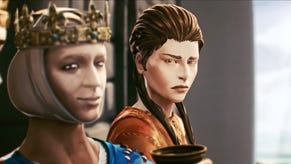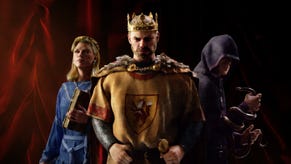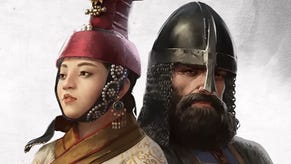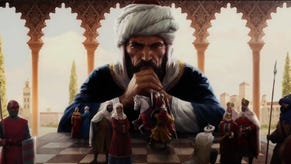Crusader Kings 3's new Royal Court DLC will arm you with Dwarf Fortress style weapons
Decorated with hanging rings of peasant skin.
Crusader Kings 3's Royal Court DLC, announced just now during the PDXCON reveal stream, is all about being a king. You'd think that was the case with Crusader Kings 3 anyway, given the game's title. But there's always room for more grandeur, and this expansion (the game's first, in fact, given that Northern Lords was dubbed a "flavour pack") will set out to deliver that - along with some correspondingly regal headaches to go with it.
As with most Paradox expansions, Royal Court will also ride onto your PC attended by a free patch. This free content will be no scurrying squire, however, dressed in tattered old sacks: it'll be a full overhaul of the game's culture system, which promises to make the dream of Viking Death Elephants real at last. I had a bit of a duck-billed chatypus with CK3's game director, Alexander Oltner, to find out what exactly will be in this big golden bag.
Crusader Kings 3 is a game which, when it's not about mass-producing giants, is about ascending through the ranks of the feudal system. There's always a feeling of slight anticlimax, then, when you become a king for the first time, and find that it's not that different from being a duke. "You've just got fancier clothes, now," concedes Oltner, underlining the issue that Royal Court sets out to solve. "But it should feel special; it should feel like you've been rewarded."
The first reward Royal Court gives you for winning the special golden hat is... well, it's a Royal Court. A big posh room - and one which you can actually peer into, since it's fully rendered on a screen of its own, with various family members, vassals and wretches from your game scattered around like spilled crisps.
Primarily, it'll be the venue for a new type of landmark event, not dissimilar to the current feasts, which you can initiate from time to time. When you convene the court, characters from your realm will show up to present you with various decision-making opportunities. "These might be weighty matters of state," says Oltner, "or petty personal grievances. But with this being Crusader Kings, nothing personal stays petty for long.”
This sounds fun from a roleplaying perspective, but I’m personally delighted to see another space in CK3 where the game's extremely fun character portrait generator can stretch its legs. It feels a bit underused right now, and one of my frustrations playing the Gigaknight save has been how rarely I get to actually see the chilling titans I’ve made, beyond their perpetual, sullen lurking in the corners of the screen.
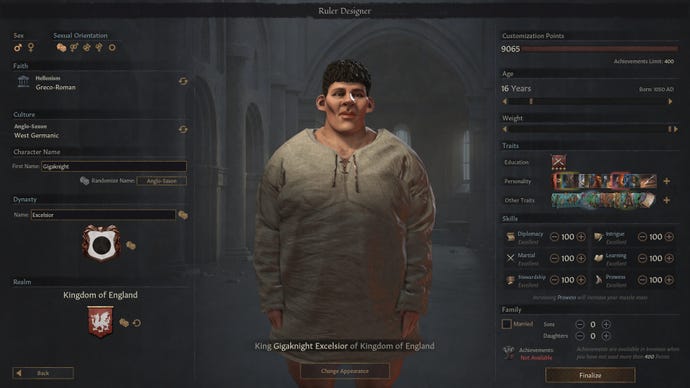
Speaking of which, the personal combat events - some of the more visual bits of the game at present - will be getting a bit of a touch-up too, not least so that you can see your character fully kitted out with their favourite stabber when it's time for them to fight.
For indeed, there are weapons in the game now, and a personal inventory system, both making a welcome return from Crusader Kings 2. Your regal rucksack can contain swords, axes, and many other types of murder weapon, including my favourite - hammers (although maybe only one-handed ones, which would be a crushing disappointment).
Weapons will have histories, and even a claim system of their own - they can be stolen in schemes, or plundered by enemies, opening the door for some delicious narrative possibilities. I can certainly imagine myself starting a ruinous, generation-long war over a stolen hammer, for example.
Even better, when the weapons are forged, they'll be assigned a whole bunch of procedural details: the more skilled the smith, and the deeper the commissioner's pockets, the more elaborate these will be. According to Oltner, the designer for the weapon generation system is a massive Dwarf Fortress fan, and "it really, really shows."
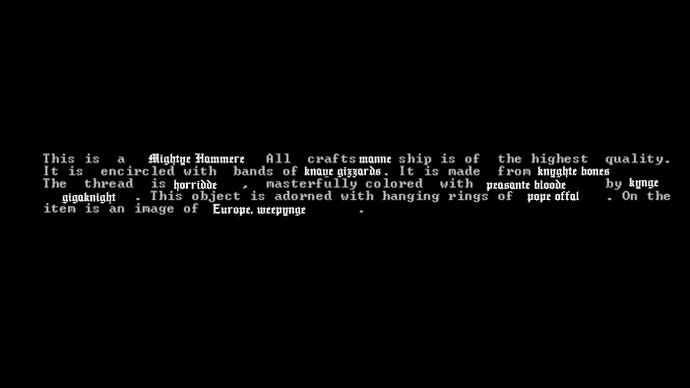
And just like in Dwarf Fortress, remarkable weapons are made by remarkable artists. "Inspired people" are a new type of wandering character that can be attracted to the festering heart of your nation, and will be able to provide you with something special - perhaps a weapon, perhaps a scholarly work, perhaps a tapestry - based on how much you're willing to pay them.
They'll be an improvement on the current court guests, who by Oltner's own admission “don’t do a lot except slow down the game”, and they'll be particularly interesting when they turn out to be grifters targeting you for a con. Because excitingly, that's very much something that can happen.
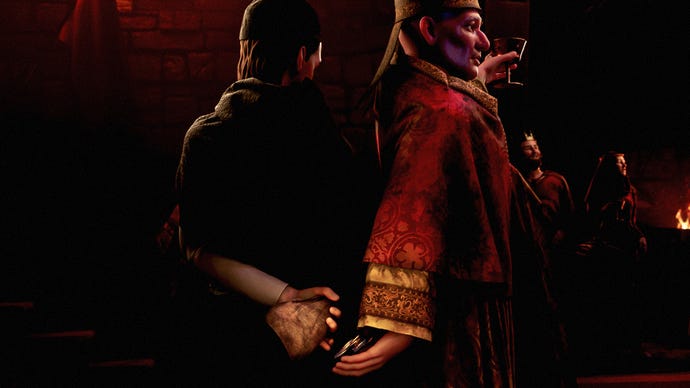
Of course, your ruler won't become some sort of tragic pack horse, carrying a load of statues and relics with him. The court screen (which will come in four visual flavours to reflect cultural groups, by the way) will act as a kind of trophy cabinet, with its own inventory where family heirlooms, masterpieces and stolen hammers can be placed in order to boast of your majesty.
It will be a very fancy room indeed, that royal court. But all those sumptuous curtains and plates of gold-coated lobsters don't come for free. Just as Batman famously said, “with great power comes a lot of responsibilities”, and as a king it will be your responsibility to outfit both your court and your character with sufficiently excessive adornments to show how disgustingly powerful you are.
A new statistic, grandeur, will basically measure how conspicuously wealthy you are, and will be earned either by sinking money into the embellishment of your ruler and their court, or by holding the aforementioned court sessions to demonstrate what a big deal you are.
Every kingdom and empire in the game will have an expected level of grandeur its ruler must meet, based on its size and power. Fail to meet it, and you’ll have a rough time diplomatically - people will laugh at you because you’re wearing a laurel wreath made of chipolatas, and you’ve got two hollowed-out pigeons for slippers. Exceed it, however, and you’ll get bonuses, such as better relations with vassals, or greater chances of attracting inspired people.
In Oltner’s view, this is the other way that Royal Court will make it more interesting to become a king, in that it will add some additional complexities and challenges to playing at a higher rank. It will also solve the current tendency for rulers of large nations to rack up gold in the midgame like a dragon with an ISA. Grandeur costs will certainly make expansionist "blobbing" a bit more gruelling to maintain, and will be another encouragement for players to try starting as lower-ranking characters.
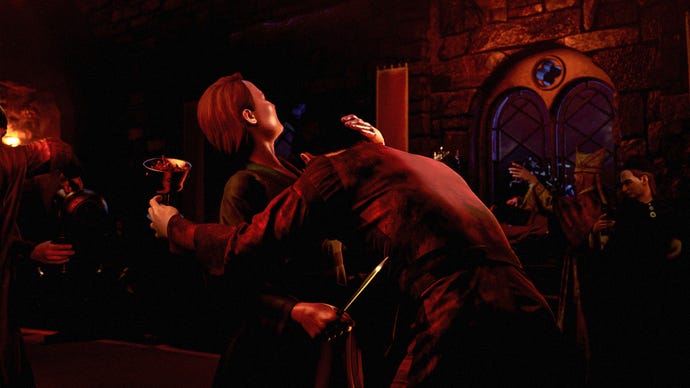
I play CK3 very much as a roleplaying game, so this all appeals to me. But Paradox have ever been keen to remind players that this is still a strategy game at its core, and Oltner is aware that some players don't want CK3 to swing too far into being an RPG. Hence the free patch accompanying Royal Court, which will add some classic Paradox systems complexity to the way culture is modelled.
At the moment, culture is a fairly simple business: it's basically a container for a name list and a dress style, and if you conquer a territory with a different culture to your own, you incur a universal flat penalty. After this patch, however, every culture will have a dynamic individual relationship with every other culture it knows.
Two similar cultures who've been coexisting alongside each other peacefully for centuries, for example, will allow for easier integration after a conquest, while the inverse will also be true. If your ruler learns the language of their new subjects, things will go more smoothly. Stuff like that.
"It's Viking Death Elephant time, baby."
But most excitingly, you can make mash-ups. Similar to the religion system, cultures now have three sets of characteristics: a core ethos ("likes fighting", "likes god"), a set of traditions (buffs, perks and special options), and "pillars" setting things like name lists, clothing, and who can command armies. If you rule over more than culture, you can choose to blend them, selecting the traditions and pillars you like best from each one.
So, yes. If your Norsemen settle in India, it's Viking Death Elephant time, baby.
Cultural divergence is also an option, if your ruler isn't the head of their culture, or if you find yourself stuck in a part of the map where your culture is a massive hindrance. Divergence will work a little like the current reformation of relgions, allowing you to ditch problem traditions, and branch off a whole new culture of your own. With elephants. You'll even be able to choose its colour on the map, which is cute.
That's about all we know for now. I would love to show you some screenshots, given that I've talked a lot about a visual feature, but we've only been allowed to show bits from the trailer. There's also no word yet on when Royal Court will be released, but you can rest assured I'll be ramming it full of elephants and pilfered mallets as soon as possible.
